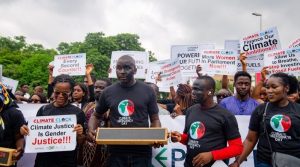As the Climate Clock ticks down below five years, signalling that there is little time left to keep global temperatures below 1.5 degrees Celsius, activists in Nigeria, including young people, journalists, environmentalists, and social rights campaigners, have called on the government to phase out the use of fossil fuels and transition to renewable energy to address the negative impacts of climate change.

This demand, they argued, is critical given the enormous cost of climate change to the country’s economy, which is expected to rise. According to the United Kingdom’s Department for International Development (DFID), Nigeria is projected to spend between 6 percent and 30 percent of its GDP by 2050 if no real adaptation action is taken to mitigate climate disruption.
Aliyu Sadiq, the National Coordinator of the Climate Clock in Nigeria, expressed his concerns about the figure, describing it as devastating.
Consequently, “we are demanding for the government to address the root causes of climate change by ending fossil fuels and investing more in renewable energy,” he declared at the 2024 Climate Emergency Day celebration in Abuja.
In addition to the foregoing, the environmentalists advocated for the implementation of policies and incentives that would discourage excessive reliance on fossil fuels and contribute to the economy’s transformation by increasing resilience in the face of climate change.
He recommended that solution-based actions be taken to reduce the carbon footprint of the citizens, continue to protect the planet, and make it better and safer for all people, including future generations.
According to Ibrahim Joseph, the Climate Clock’s Coordinator for West Africa, increasing public awareness is vital to inspiring Nigerians to take action in response to the climate emergency.
Joseph said this belief motivated him and his team to mark the celebration, use the opportunity to seek the halting of fossil fuel usage, and push for the adoption of cleaner energy technologies in Nigeria.
The eco-defender wishes to see more women participate in the climate conversation so that they can make sound decisions because they are more familiar with the environment.
“Women are closer to the environment, and if we have more of them represented in government and the renewable sector, we will make more progress,” he noted.
Nigeria can transition to a greener economy, says Lauritta Boniface, co-founder of the Ecocykle Development Foundation (EDF). All the government has to do is provide the necessary political will in the form of policies, because little can be accomplished without these laws.
“Part of our demand is for more women to be represented in parliament because the effects of climate change are rooted in grassroots communities, and women are more vulnerable to its hazards,” she said.
The young negotiator, who is one of Nigeria’s representatives in the international climate debate, states in her submission that every little bit of action counts towards increasing Nigerians’ resilience to climate change and ensuring the country’s sustainable future.
By Etta Michael Bisong, Abuja
